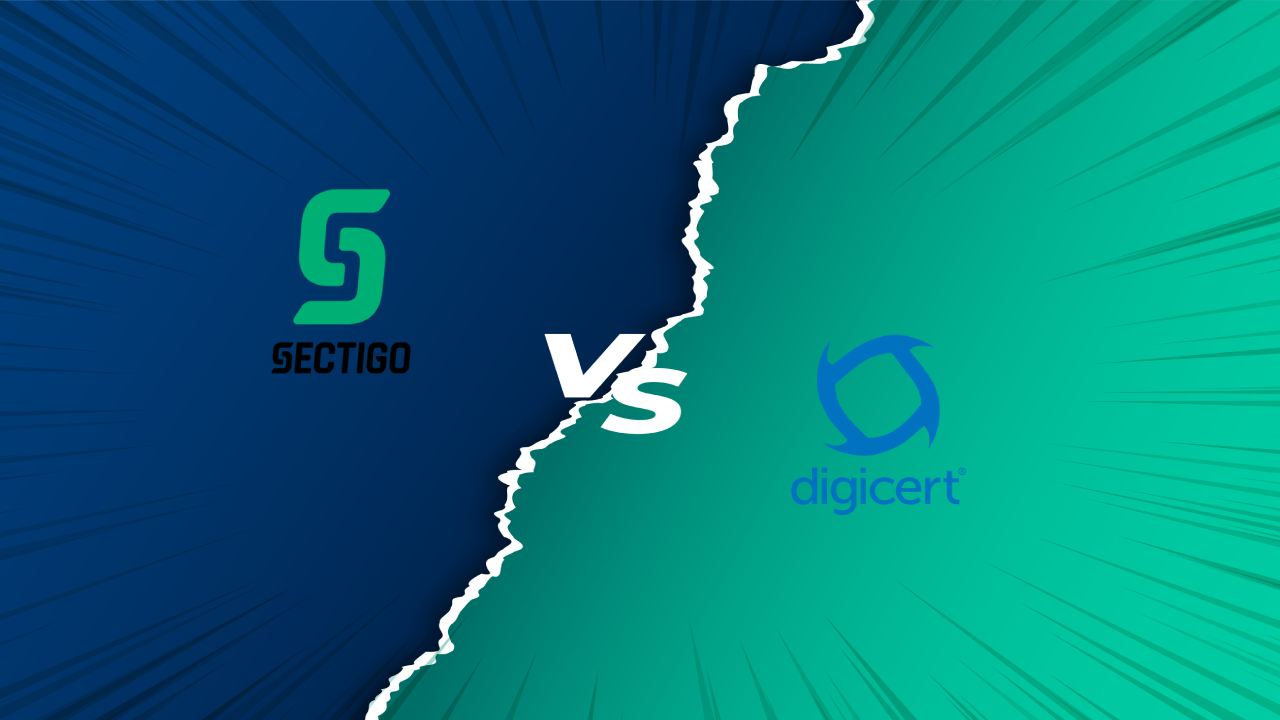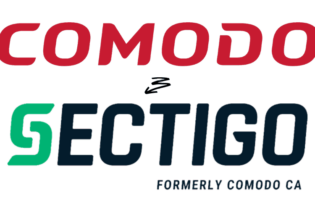
Sectigo and DigiCert are two standout SSL brands that top the market share for commercial Certificate Authorities. Both offer full-fledged encryption solutions and a wide range of products to meet different needs. While DigiCert focuses exclusively on the high-assurance market, Sectigo has an SSL certificate for everyone, regardless of size, niche, and budget.
New SSL buyers often face the dilemma of what SSL certificate to choose. The price disparity can be huge, and many are left wondering why. In this article, we’ll compare the two major brands and their features so you can pick the right cert for your particular project.
Table of Contents
- Sectigo and DigiCert History.
- Sectigo vs DigiCert: Encryption Strength.
- Sectigo vs DigiCcert: Validation Level.
- Sectigo vs DigiCert: What Can They Secure?
- Sectigo vs DigiCert: Site Seals.
- Sectigo Vs DigiCert: SSL Warranty.
- Sectigo vs DigiCert: Price.
Sectigo and DigiCert History
Let’s start with a bit of history and see how Sectigo and DigiCert evolved over the years.
Sectigo (formerly Comodo) Timeline
1998 – Melih Abdulhayoğlu, a Turkish-born American, founded Comodo, an Internet security company, in the United Kingdom.
2004 – The company relocated to the United States.
2005 – Abdulhayoğlu established the CA/Browser Forum – a voluntary industry body of Certificate Authorities (CAs) and web browsers promoting the guidelines for the issuance and management of digital certificates.
2007 – The CA/Browser Forum officially ratified the first version of the Extended Validation (EV) SSL Guidelines.
2017 – Francisco Partners acquired Comodo Certification Authority (Comodo CA) from Comodo Security Solutions, Inc.
2018 – Francisco Partners rebranded Comodo CA to Sectigo
DigiCert Timeline
2003 – Ken Bretschneider founded DigiCert
2007 – DigiCert partnered with Microsoft to develop the first multi-domain SSL certificate.
2015 – DigiCert acquired the CyberTrust Enterprise SSL business from Verizon Enterprise Solutions, becoming the world’s second-largest certificate authority for high-assurance or extended validation (EV) TLS/SSL certificates.
2017 -DigiCert bought the TLS/SSL and PKI businesses from the world’s leading certificate authority, Symantec (including brands GeoTrust, RapidSSL (part of GeoTrust), Thawte, and Verisign), for $950 million.
2022 – According to the independent survey company Netcraft, DigiCert is the world’s largest high-assurance certificate authority, with 58% of the Extended Validation SSL certificate market share and 95% of organization-validated certificates globally.
Sectigo vs DigiCert: Encryption Strength
An SSL certificate’s main job is to secure sensitive communications between browsers and web servers. Weak encryption would allow cyber thieves to crack passwords, steal payment details, and threaten the entire fabric of online commerce.
To avoid this, all SSL certificates issued by trusted Certificate Authorities follow the same cryptographic protocols. So when it comes to encryption, there is no difference between Sectigo and DigiCert. Most of today’s SSL certs offer 256-bit encryption strength. This is more than enough to keep hackers away, as breaking it is beyond human capabilities.
Sectigo vs DigiCcert: Validation Level
After encryption, the validation level is the second most important aspect of SSL certificates. It determines the extent of the applicant’s identity verification by the Certificate Authority.
Domain Validation (DV) verifies website ownership only and doesn’t require paperwork. You can get a DV SSL certificate within five minutes by passing a straightforward verification process. DV certificates are ideal for smaller websites, blogs, and online portfolios. Sectigo offers DV certificates. DigiCert doesn’t, but you can also get a premium DV certificate from Thawte or GeoTrust – both brands are owned by DigiCert company.
Business Validation (BV) or Organization Validation (OV) verifies the identity of the company requesting the SSL certificate. Along with domain ownership, the CA attempts to validate the legal credentials such as the official name, registration number, country of residence, phone number, etc. To pass BV, you need to submit relevant documents to CA, confirming all of the above. BV certificates are perfect for small to medium size companies, startups, NGOs, and e-commerce platforms. You can get OV certificates from Sectigo as well as from DigiCert.
Extended Validation (EV) follows the same process as Business Validation but goes deeper into your company’s legal details and requires additional paperwork. EV certificates provide the highest level of assurance to customers and protect websites against phishing attacks. EV SSL is best suited to high-profile brands, enterprises, banks, and financial institutions. You can get EV certificates from Sectigo as well as from DigiCert.
Sectigo vs DigiCert: What Can They Secure?
SSL certificates can secure simple websites and complex systems. Let’s see how versatile Sectigo and DigiCert certificates are.
One-domain SSL certificates: As the name implies, these certificates secure a single domain and don’t cover additional domains or subdomains. As this is the most common type of certificate, both Sectigo and DigiCert offer a wide range of one-domain SSL certs.
Wildcard SSL Certificates: When you need to secure a subdomain, the best option is to get a Wildcard certificate. Wildcard SSL encrypts an unlimited number of subdomains along with the main domain under a single SSL installation. Sectigo provides DV and BV wildcard certificates, while DigiCert offers premium BV Wildcard products.
Multi-Domain SSL Certificates: These certificates can secure multiple domains or subdomains under one installation. Sectigo multi-domain certs include 3 domains by default, while DigiCert multi-domain SSL comes with 1 domain by default. Both brands allow you to add additional domains for a fee. In total, they support up to 250 domains or subdomains.
Multi-Domain Wildcard SSL Certificates: Multi-Domain Wildcard SSL Certificates are the most flexible SSL products. With a single Multi-Domain Wildcard cert, you can secure all your subdomains on multiple domains. Sectigo offers multi-domain wildcard certificates. Depending on your needs, you can select a DV or BV option.
Code Signing SSL certificates: These certificates don’t encrypt websites but secure downloadable software such as drivers, apps, scripts, and codes. Code Signing certs ensure that software belongs to a verified company or developer and protect its code from being altered by external forces. Both DigiCert and Sectigo offer Code Signing certs for businesses and individuals. However, their validation methods differ, with DigiCert having a quicker and easier verification process.
Documents and Email SSL Certificates: Did you know you can also add bulletproof encryption to office documents and emails? With email being the number one target for cybercriminals, Doc/Email certificates encrypt the content and verify the sender’s identity. Also called S/MIME (Secure/Multipurpose Internet Mail Extensions), these digital certificates are available at Sectigo and DigiCert.
IP Address SSL Certificates: Sometimes, you need to encrypt an IP Address instead of the FQDN (fully-qualified domain name). Here’s where IP address certificates come to the rescue. They support public IPs only, and not all CAs offer them. Sectigo is one of the few brands that provides an IP address certificate. DigiCert doesn’t.
Sectigo vs DigiCert: Site Seals
Site seals are an extra feature of commercial certificates that display proof of trust. You can add them anywhere on your website to boost customers’ confidence. Depending on the SSL product, you can get a static or dynamic seal. Entry-level Sectigo certificates come with static site seals, but all DigiCert certificates feature dynamic seals.
Sectigo Vs DigiCert: SSL Warranty
SSL warranty adds an extra layer of security in the unlikely scenario of a data breach. The warranty amount depends on the validation level and brand image. Since Sectigo offers SSL certs for every budget, their warranties extend from $10,000 to a whopping $1,750,000. On the other hand, DigiCert being a premium brand and a high-assurance CA offers warranties within the $1,500,000 and $2,000,000 range.
Sectigo vs DigiCert: Price
The most significant difference between Sectigo and Digicert is the price. Sectigo has over 3 million customers worldwide and is one of the most affordable Certificate Authorities. Their Positive SSL product line features budget certificates for every need. Sectigo certificates start at just $7.66, while the most expensive one is $416 per year.
DigiCert, in comparison, is a premium CA serving large enterprises, Fortune 500 companies, and financial institutions. The cheapest DigiCert product costs $300, while the most expensive is over $3000. DigiCert offers a lot higher warranties on their certificates than most other CAs, and the validation process is much faster.
Conclusion
Sectigo and DigiCert are reputable Certificate Authorities with distinct business strategies and target markets. Thanks to its pricing policy, Sectigo makes commercial SSL certificates accessible to everyone. For small businesses on a tight budget, Sectigo certificates are the most viable solution.
DigiCert is the go-to brand for the premium segment. It commands the high-assurance market and is the preferred encryption option for large organizations. The most innovative companies, including 89% of the Fortune 500 and 97 of the 100 top global banks, use DigiCert services to protect customers’ sensitive data.
To compare both brands product by product, use our advanced certificate filter.
Vs background vector created by starline – www.freepik.com
Save 10% on SSL Certificates when ordering today!
Fast issuance, strong encryption, 99.99% browser trust, dedicated support, and 25-day money-back guarantee. Coupon code: SAVE10
























